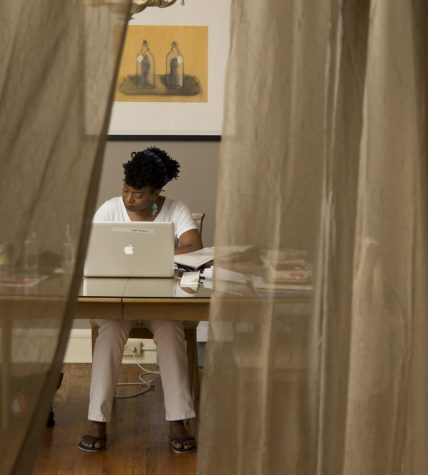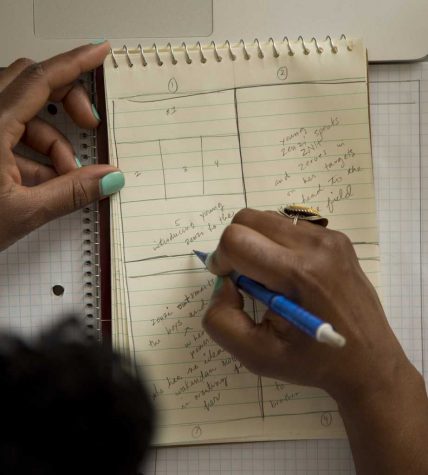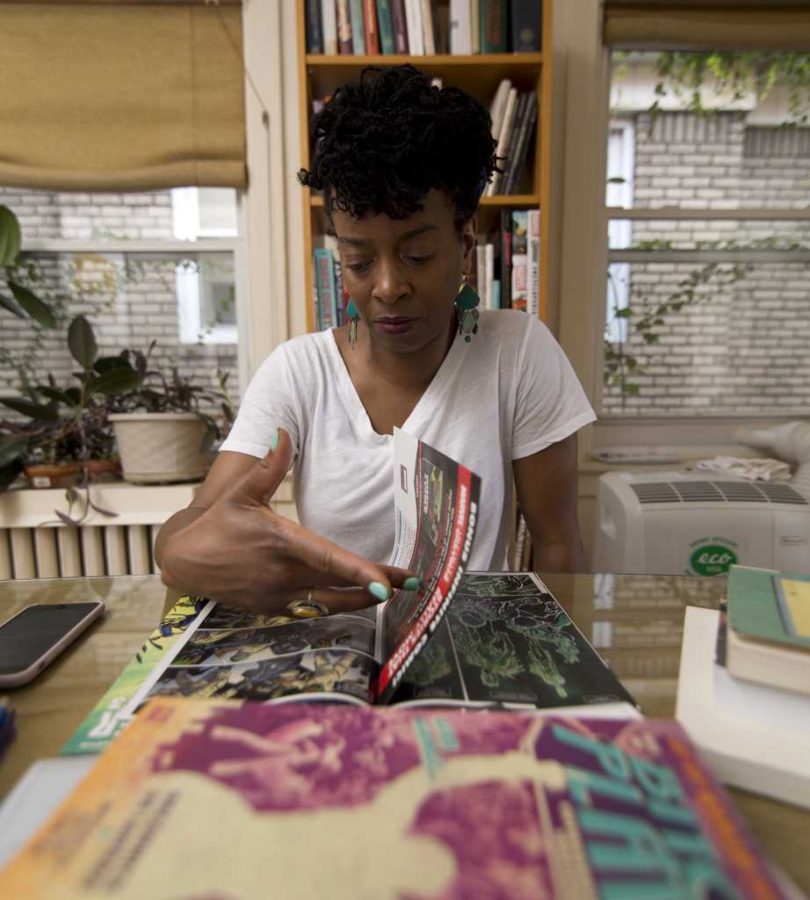Poetry and comics have more in common than you think.
Yona Harvey, a Pitt English professor, recently accepted a deal to write a 10-page story for the upcoming Marvel “Black Panther” spin-off comic series. Ta-Nehisi Coates, writer for The Atlantic and author of “Between the World and Me,” pens the current “Black Panther” run, with the bulk of the upcoming spin-off, “World of Wakanda,” written by Coates and feminist author Roxane Gay.
The announcement came soon after Marvel found itself in hot water in early July, when readers complained on social media that no Marvel property had ever been helmed by a female, black writer. Information that an upcoming series about a black, female Iron Man would be written by a white man helped to kick things off. In addition to Gay and Harvey, Marvel also hired two black, female artists, Alitha Martinez and Afua Richardson, to draw the art for the comic’s art and cover, respectively.
The series will mostly deal with Aneka and Ayo, two former Wakandan government warriors who are now on the run and deep in love. Harvey’s 10-page feature will focus on Zenzi, a revolutionary figure who can isolate and extrapolate a person’s deepest feelings. This makes her a natural revolution leader and more than a thorn in Black Panther’s vibranium suit. Harvey says she is very excited and that she “couldn’t have picked a better character to write for.”
“It’s really exciting writing about a villain,” Harvey said. “Especially for me, because I feel so clamped down … in my normal life, so well-behaved,” she finishes with a laugh.
Harvey wasn’t able to disclose whether the Zenzi story will be a prequel or a sequel to Coates’ issues — “I don’t know if I should say,” she said. “I don’t know if I’m allowed to say!” — but she assured that it will focus on reflecting on Zenzi’s present story.
“I think she’s very intelligent and mysterious,” Harvey said. “And when she appears in the series you don’t really know a lot about her [or] her personal life and you don’t know why she has decided to take the path that she’s taken.”
Harvey and Coates attended Howard University together, a historically black university she says influenced both of their writings. This influence also stretches to her appreciation of works like “Black Panther.”
“It’s just always exploring tensions and alliances and disagreements and insights that are happening across the African diaspora,” she said of the comic. “That’s always been infinitely appealing to me, so I love being able to think about that more and apply it to Wakanda. I mean that just totally geeks me out.”

Harvey says, as a poet, she’s always considered herself a visual thinker, and explained how poets, like comic writers, have to condense life into as few words as possible.
“I think it’s more in the thinking, like when you’re a poet you do sort of shrink moments,” she said. “A lot can happen across the day, from the time you wake up to the time you go to bed. There’s something about when you’re a poet, you’re able to sort of zero in on very specific moments, maybe the most tense or terse moments of the day, and I like putting that way of thinking to use for a comic. Because you do have to be super precise.”
Though the writing shares some craft elements, the audience crossover between poetry and comics isn’t one-to-one, according to Harvey.
“I’ve had friends who have said, ‘Man, it’s been years since I’ve read a comic book,’ or ‘I’ve never read a comic book and this’ll be the first time that I’m reading a comic,’ and that’s really exciting to think about poets who are reading comics for the first time,” she said.
Another aspect of comic writing that excites her is collaborating with a visual artist. This cross-medium collaboration is something she’s continually encouraged her students to do and gives her a chance to set another example.
“I love the idea of working with a visual artist and imagining how everything is going to look, how everything is going to turn out in the end,” Harvey said, going on to explain that she got a “healthy dose” of artist collaboration at Pittsburgh’s Flight School, a professional development group for upcoming artists.
Harvey already has experience mixing the arts, but apparently she also has experience writing comics. She says it was when she was an undergrad at Howard, about the age of 19.
“All my closest friends at that time … were guys and they started a comic book company,” she said. “So I wrote a guest issue for that and that was my real intro to looking at comics more seriously.”
When asked what the story was about, she can barely get the answer out through a fit of laughter. “It was called “Flatbush Maiden,” it was about this guy who could … fly — I don’t know, it’s been a long time. It’s been a really long time.” She punctuates this sentence with another laugh before continuing. “But in my issue he was … hiding out and I was writing a female character and she worked in a morgue and she was hiding this character in the morgue.”

When asked which “Black Panther” character Harvey identifies with most, and with several strong female characters to pick from, she chooses Shuri, Black Panther’s sister.
She pauses to consider her answer. “A lot of people have a relationship with her, she has a relationship with her brother, with her mother — she’s trying to balance a lot of people’s needs in addition to her own life. I like that, I think that’s a very real character to me. That’s a character that really speaks to me, trying to juggle so many things and so many people and also secure her own survival.”
Harvey has tried to maintain her attention to comics since school, citing “Hip Hop Family Tree” by Ed Piskor, who she met at Flight School, and Jessica Abel’s “La Perdida” as some of her favorites. “I always go to Phantom of the Attic” — the comics store on Craig Street in Oakland — “and I’ll just pick up things that I see that look interesting to me, just to stay current,” she said.
She derives poetic inspiration from such random places as visual arts, music and overheard conversations. But her narrative inspiration comes from one main source — her children. Harvey is afraid this sounds too cliché, but sometimes clichés work.
“As a writer or as an artist you want the world to be better than it was when you were born into it,” she explains. “And so I think about the character that I want my children to be able to meet in the future and in their reading lives, and that is really empowering and very inspiring to me.”
Ultimately, the poet-professor is simply thankful for the opportunity to write a comic, and aware of what this means for potential black, female comic scribes. She repeats a quote from Roxane Gay, about the need for overdue change: “When you get sort of a trickle and you need a flood.” This news is certainly a burst dam that was quite overdue for a flood anyway.
“I’m really excited that Marvel has gone all-out and committed to four black women writers and visual artists to change the way that these stories are told,” she said. “There [are] so many great stories. It’s a very beautiful thing.”



